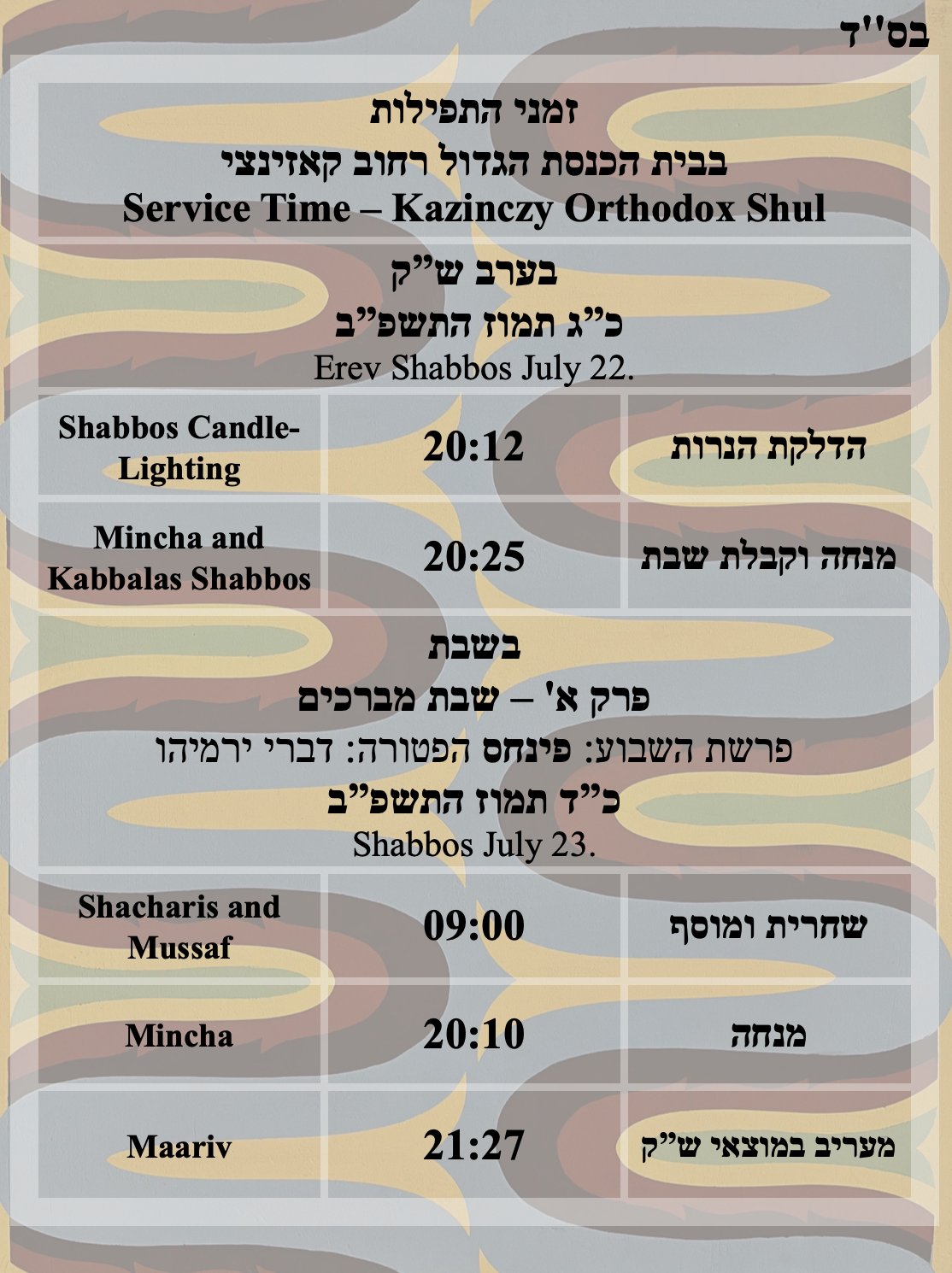Párását Pinchász – Parashat Pinchas
„Legyen neki és magzatjának utána örökös papságnak szövetsége azért, hogy buzgólkodott Istenéért és engesztelést szerzett Izrael fiai számára.” (4Mózes 25:13.)
Minden bűnös ember úgy védekezik, hogy: „ő is ezt csinálta”. Ezért az Örökkévaló a tízparancsolatot egyes számban mondta, hogy mindenki úgy értse, hogy neki lett meg parancsolva egyedül és nem kell másokra tekintenie.
Pinchesz egész biztosan tekinthetett volna Mózesre, Áronra, illetve a hetven bölcsre, és mondhatta volna: ha ők nem tesznek semmit, miért kellene nekem jobban igyekeznem? Miért legyek „vallásosabb” náluk? Mégsem így gondolta, hanem tette, amit szerinte tennie kellett a Teremtő tiszteletére. Ezért áll így a Tórában: „buzgólkodott Istenéért” – mintha csak az „övé” lenne, és neki egyedül kötelessége megmenteni az Örökkévaló tiszteletét, habár senki más nem teszi ezt… (Chajmász És).
„Rendeljen az Örökkévaló, minden test szellemeinek az Istene, férfiút közösség fölé, […]”(4Mózes 27:16.)
RáSI azt mondja: „Miután meghallotta Mózes, hogy azt mondja neki a Teremtő, hogy »adj nekik (Czölofchod lányainak) örök birtokot atyjuk fivérei között,« (4Mózes 27:7.), azt mondta elérkezett az ideje, hogy magamnak is kérjek, hogy örököljék fiaim nagyságomat.”
Kérdés az, hogy miért pont itt kéri Majse rábénu, hogy örököljék őt fiai? Hiszen Czölofchod lányainál az új információ csak az volt, hogy a lányok is örökölnek, hogy fiúk öröklik atyjukat már tudta Mózes előbb.
Majse Rábénuról tudjuk, hogy szerényebb volt minden embernél, és úgy gondolt magára mint bűnös emberre. Azt gondolta, hogy egy bűnös ember nem hagyhat örökséget gyermekeinek. Most azonban mikor az Örökkévaló megparancsolta, hogy adja Czölofchod lányainak atyjuk örökét, – bár ők maguk mondták, hogy apjuk „a maga vétkében halt meg […]” (4Mózes 27:3.) – megértette, hogy a gyermekek nem veszítik el az örökségüket ősük bűne miatt. Ezért itt kérte, hogy fiai örököljék őt, habár, hogy magára bűnösként tekintett (Rabbi Mordecháj miCsernobil).
Gut sábesz, Paskesz Zev

Parashat Pinchas deals with many different topics – the genealogy of the tribes, the apportionment of Eretz Yisrael, the appointment of Yehoshua, and the reward granted to Pinchas himself.
In this parasha, Pinchas achieved the Kehunah. This was due to his showing that he possessed the qualities required to be a Kohen. His act of zeal was performed on behalf of the entire nation, to achieve atonement for them. The Bnei Yisrael had fallen to a shockingly low moral level. By Pinchas acting publicly to execute Kozbi and Zimri, and the rest of the people not protesting, he achieved an atonement for them. His actions were based on a deep concern for his brothers.
Later, the parasha discuss the Kohanim have an inherent deep – rooted love for Am Yisrael, one that causes them to care greatly for the spiritual welfare of others. This is what caused him the merit of eternal Kehunah. Pinchas merited the privilege of Kehunah for his descendants for all eternity.
Later, the parasha discusses the apportionment of the land , and with this comes the subject of inheritance. Childern aren’t merely new people that their parents happen to bring into the world – they are extensions of their parents, expressions of their parent’s potential.
This what lies behind the protest of the daughters of Tzelafchad. “Why should our father’s name be ruined?” “Why should his death be absolute and terminal?” Granted, the ideal situation of his having a son isn’t present, but at least let him live on through his daughter’s estate. Their case was valid, and they were allowed to inherent their father’s estate. (Brea, Slifkin)
Shabbat Shalom, Paskesz Sharon

